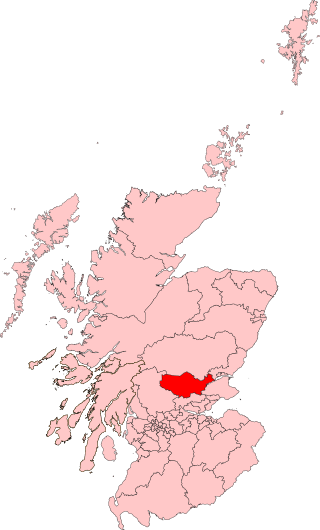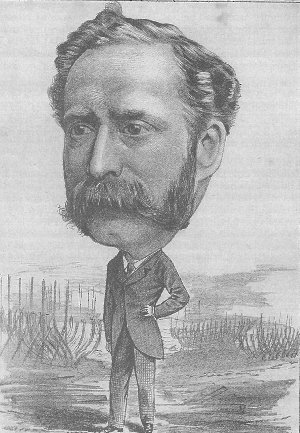
Glasgow Central was a constituency of the House of Commons of the Parliament of the United Kingdom until 2024. A Glasgow Central constituency existed from 1885 until its abolition in 1997. Prior to the 2005 general election, boundary changes led to a new constituency named Glasgow Central being introduced. The constituency was abolished again prior to the 2024 general election. Prior to its abolition, the seat was held by Alison Thewliss of the Scottish National Party (SNP). The first iteration of this constituency was the seat of the former Conservative Prime Minister Bonar Law, who was the shortest-serving UK Prime Minister of the twentieth century.
Elgin Burghs was a district of burghs constituency of the House of Commons of Great Britain from 1708 to 1801 and of the House of Commons of the United Kingdom from 1801 to 1918. Until 1832, when Peterhead was added, the constituency comprised the parliamentary burghs of Elgin, Cullen, Banff, Inverurie and Kintore, lying in Elginshire, Banffshire and Aberdeenshire.
Edinburgh was a burgh constituency of the House of Commons of the Parliament of Great Britain from 1708 to 1801 and of the Parliament of the United Kingdom from 1801 until 1885.
Aberdeen was a burgh constituency of the House of Commons of the Parliament of the United Kingdom from 1832 until 1885. It was represented by one Member of Parliament (MP), elected by the first past the post voting system.
Dundee was a constituency of the House of Commons of the Parliament of the United Kingdom from 1832 to 1950, when it was split into Dundee East and Dundee West.
Paisley was a parliamentary constituency represented in the House of Commons of the Parliament of the United Kingdom from 1832 until 1983, when it was divided into Paisley North and Paisley South. These two constituencies were in turn amalgamated into Paisley and Renfrewshire South and Paisley and Renfrewshire North in 2005.
Greenock was a burgh constituency represented in the House of Commons of the Parliament of the United Kingdom from 1832 until 1974, when it was abolished and its area was merged into the new Greenock and Port Glasgow constituency.
Glasgow Bridgeton was a parliamentary constituency in the city of Glasgow. From 1885 to 1974, it returned one Member of Parliament (MP) to the House of Commons of the Parliament of the United Kingdom, elected by the first-past-the-post voting system.
Glasgow Govan was a parliamentary constituency in the Govan district of Glasgow. It was represented in the House of Commons of the Parliament of the United Kingdom for 120 years; from 1885 until 2005, returning one Member of Parliament (MP) elected by the first-past-the-post system.
Glasgow Partick was a burgh constituency represented in the House of Commons of the Parliament of the United Kingdom from 1918 until 1950.
Glasgow St. Rollox was a burgh constituency represented in the House of Commons of the Parliament of the United Kingdom from 1885 until 1950. It elected one Member of Parliament (MP) using the first-past-the-post voting system.

Glasgow Tradeston was a burgh constituency represented in the House of Commons of the Parliament of the United Kingdom from 1885 until 1955. It elected one Member of Parliament (MP) using the first-past-the-post voting system.
Dunbartonshire was a county constituency of the House of Commons of Great Britain from 1708 to 1801 and of the House of Commons of the Parliament of the United Kingdom from 1801 to 1950.

Perth was a constituency of the House of Commons of the Parliament of the United Kingdom from 1832 to 1918, 1918 to 1950, and 1997 to 2005. From 1832 to 1918 it was a burgh constituency. From 1918 to 1950, and 1997 to 2005, it was a county constituency. During each of the three periods it elected one Member of Parliament (MP).
Glasgow Blackfriars and Hutchesontown, representing parts of the city of Glasgow, Scotland, was a burgh constituency represented in the House of Commons of the Parliament of the United Kingdom from 1885 until 1918.
Armagh was an Irish constituency in the House of Commons of the United Kingdom from 1801 to 1885.
Athlone was a parliamentary constituency in Ireland, which from 1801 to 1885 returned one Member of Parliament (MP) to the House of Commons of the United Kingdom of Great Britain and Ireland.
Carlow was a parliamentary constituency in Ireland, represented in the House of Commons of the United Kingdom of Great Britain and Ireland. It returned one Member of Parliament (MP) from 1801 to 1885.
Belfast was an Irish borough constituency in the House of Commons of the United Kingdom of Great Britain and Ireland. Comprising the city of Belfast, it elected one Member of Parliament (MP) from 1801 to 1832, and then two MPs from 1832 until the constituency was divided by the Redistribution of Seats Act 1885 before the 1885 general election.

Sir William Pearce, 1st Baronet was a British shipbuilder, under whose management the Fairfield Shipbuilding and Engineering Company in Govan on the River Clyde became the leading shipbuilding company in the world. He was later a Conservative Party politician.



